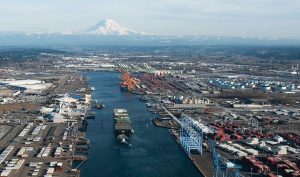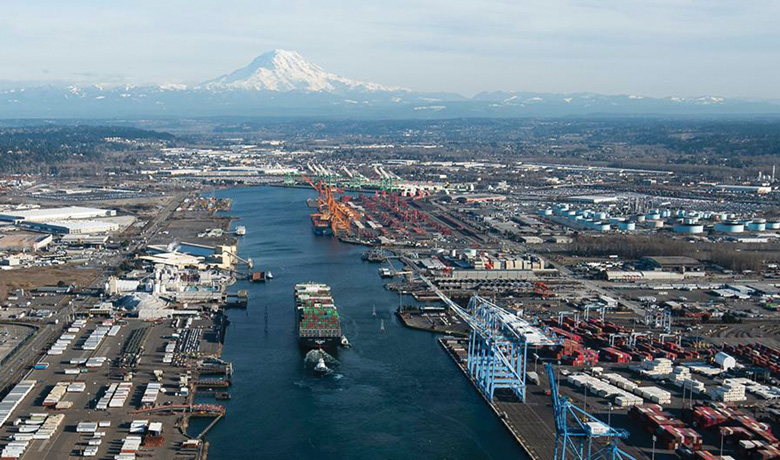
A study detailing how a private 5G network would enable the Tacoma Tideflats to accelerate current and future technology innovation and establish global leadership in the maritime industry has been published by a non-profit, software development company, and partners.
Washington Maritime Blue, a non-profit, strategic alliance formed to accelerate innovation and sustainability in a blue economy, and software development ecosystem 5G Open Innovation Lab, in collaboration with two of its founding partners, published findings and recommendations from the Tacoma Tideflats 5G Network Feasibility Study in late January.
In addition to technology acceleration, the study also lays the foundations for the Tacoma Tideflats to build and launch a private enterprise 5G network before the end of the year. The Tacoma Tideflats covers more than 5,000 acres and is the base of port and terminal operations, industrial and manufacturing hubs and a critical marine ecosystem.
Maritime Blue has said that it plans to dedicate funding to make the Tacoma Tideflats “one of the first commercial ports in the U.S. to establish itself as an innovation and sustainability trailblazer fueling a growing maritime economy and blueprint for other ports around the world.”
Fewer than 10 ports globally currently offer a private 5G network, according to the study.
“The implementation of a private 5G network would establish the infrastructure for those working in the Tideflats today to utilize the technology they’re envisioning for the next decade and beyond,” Washington Maritime Blue founder and CEO Joshua Berger said. “We will create an ecosystem like no other in the world to attract innovators building the technology of the future. This is an essential next step to maintain and support the growth of the maritime industry and blue economy.”
Two of the 5G Open Innovation Lab’s founding partners, digital and cloud services provider Avanade and communications services company Amdocs also aided in the publishing of the study.
Avanade conducted a series of interviews and workshops that uncovered specific use-cases in collaboration with key stakeholders to identify the business value and technology pathway to build and use a private 5G network across the Tideflats.
International ports are expected to implement private 5G wireless networks to modernize their operations. The scenarios identified by Avanade highlight the potential for the Tideflats to be a global leader in advancing port operations, advanced manufacturing, and environmental services.
Four key themes emerged from the feasibility study:
- Orchestration and Efficiency: Working together in new ways, enabled by data and technology, to create efficiency and transparency across the Tideflats, offering an end-to-end view of the supply chain.
- Infrastructure Modernization: Improve the physical and virtual infrastructure including where equipment is moved and stored, traffic management, connectivity dead zones, siloed data, manual processes and cybersecurity.
- Improving Safety: Concerns for worker and community safety and the desire to consider new ways of operating to prioritize safety.
- Enabling a Sustainable Future: Put ecological and community health at the forefront of Tacoma Tideflats operations, technologies, and processes.
“Technology, and the smart use of it, is essential for our complex ecosystem to meet the demands of today while creating a vital platform of innovation for the future,” 5G Open Innovation Lab founder and General Partner Jim Brisimitzis said. “The use-case-first approach we took with the study will help the Tacoma Tideflats ecosystem with its digital transformation goals today and well into the future.”
“This feasibility study is a visionary playbook the Tideflats ecosystem can now leverage to thoughtfully develop plans and investments,” he added.
5G Open Innovation Lab partners also collaborated on the feasibility study, lending its global perspectives and best practices. The study was produced by Avanade and Amdocs in partnership with the City of Tacoma, the Washington State Department of Commerce, Husky Terminal & Stevedoring and others.
“We are pleased to be part of this collaborative effort showcasing Tacoma’s ‘can do’ attitude,” City of Tacoma Director of Community and Economic Development Jeff Robinson said. “This project can help solve real business challenges through access to emerging technology across the Tideflats, and will identify Tacoma as a destination for those looking to develop technologies in support of sustainable maritime and related industries.”
Maritime Blue and the 5G OI Lab have said they’re now preparing to further engage with coalition partners to pilot a private 5G network that would highlight the technology’s potential to constituents by creating a network proof-of-concept zone and testing a subset of key use cases.
“Building out dense coverage enables early adoption and pilot use cases for partners such as Husky Terminal and allows a broader set of stakeholders to see value in the network for their own operations,” the study partners said in a statement. “It will also generate vast data sets that could be used to inform shared data solutions.”
“Husky has been a committed partner throughout the process and is ready to make investments for building out key business use cases that reside on top of a private network recommended in the feasibility study,” Husky Terminal and Stevedoring, LLC President Dustin Stoker said.
“Through knowledge sharing, collaborative project development, and enabling an ecosystem for innovation, the Tacoma Tideflats will collectively realize a shared vision for a sustainable and equitable economy and port community,” the study’s partners said in a statement. “The feasibility study is now a key driver to secure funding for implementation from industrial partners, federal and state government.”

